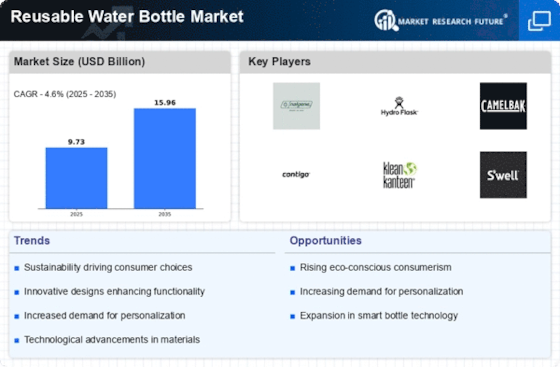Top Industry Leaders in the Reusable Water Bottle Market

Reusable Water Bottle Market
The reusable water bottle market is experiencing a surge, driven by growing environmental awareness, rising health consciousness, and increasing government regulations on single-use plastics. This dynamic market boasts diverse players, each vying for a share in the pie. Let's delve into the competitive landscape, exploring key strategies, market share influencers, industry news, and recent developments.
Competitive Strategies:
-
Innovation: Brands are constantly innovating, offering bottles with unique features like temperature control, self-cleaning technology, and built-in filters. Hydro Flask's TempShield™ insulation and S'well's leak-proof lids are prime examples.
-
Sustainability: Eco-conscious consumers are attracted to brands prioritizing sustainable materials and production processes. Klean Kanteen's use of recycled steel and Nalgene's commitment to BPA-free plastics resonate with this segment.
-
Branding & Community: Building strong brand identities and fostering communities around their products is crucial. YETI cultivates a cult following through influencer marketing and exclusive collaborations, while S'well leverages social media to build a community-driven brand image.
-
Partnerships & Acquisitions: Strategic partnerships and acquisitions help companies expand their reach and offerings. Contigo's acquisition of Autospout International broadened its product portfolio, while LARQ's partnership with Starbucks increased brand visibility.
-
Direct-to-Consumer (DTC) Model: Bypassing traditional retail channels, DTC brands like LARQ and HidrateSpark offer personalized experiences and control over brand messaging.
Factors Influencing Market Share:
-
Price & Quality: Consumers seek a balance between affordability and durability. Brands like Contigo cater to budget-conscious buyers, while Hydro Flask targets premium quality seekers.
-
Target Audience: Understanding and catering to specific demographics like athletes, children, or professionals is key. CamelBak prioritizes hydration solutions for outdoor enthusiasts, while SIGG focuses on stylish bottles for urban professionals.
-
Distribution Channels: Reaching consumers through their preferred channels is essential. Online marketplaces like Amazon offer wide reach, while physical stores provide instant gratification and brand visibility.
-
Marketing & Advertising: Effective marketing campaigns raise brand awareness and create positive associations. YETI's focus on storytelling and influencer marketing sets it apart.
-
Sustainability Credentials: Consumers increasingly value brands with strong environmental commitments. Patagonia's use of recycled materials and commitment to activism attract eco-conscious buyers.
Key Players
- Tupperware Brands Corporation
- SIGG Switzerland AG, GmbH
- CamelBak Products, LLC
- Klean Kanteen
- Contigo
- Aquasana Inc.
- Hydaway
- Nalgene
- S’well
Recent Developments :
February 2021: Hydaway just introduced a new design for its pocket-sized collapsible bottle. It comes in two sizes, 25 ounces and 17 ounces, and has a conventional cap closure and a practical spout lid. Silicone and BPA-free material are used to make the bottle.
December 2018: Split Peak disclosed that it had acquired Clean Bottle, a manufacturer of reusable water bottles. This acquisition is anticipated to use Split Peak's resources to expand the current workflows and provide Clean Bottle's clients with exciting new solutions.
In October 2023, the Austrian packaging firm Alpla Group and German mineral water producer Tönissteiner joined forces to create a reusable PET water bottle from 100% recycled materials.
In October 2023, a US company which deals in patent licensing, InventionHome, developed easy to clean, reusable stainless steel bottles with caps on both ends.
In April 2023, Nalgene announced that it has begun manufacturing reusable bottles with Eastman's Tritan Renew, which contains 50% certified post-consumer recycled plastic. The company that is based out of the pacific northwest US, explained that they started the switch from Copolyester to Tritan Renew in 2020 and completed it in 2023 and in doing so, recycled over two million pounds of plastic.
In February 2023, a team comprised of seven men and six women represented SIGG Switzerland AG during the Dutch tennis tournament ABN AMRO Open and supplied all players with reusable water bottles made blends of Tritan Renew, which meet sustainability standards set by the ISCC.
In December 2022, outdoor drinkware companies such as Stanley, YETI, MiiR, and Klean Kanteen launched an initiative known as the Drinkware CoLab. Their intention is to cut down on carbon emissions in their supply chain and endorse the Outdoor Industry Association's (OIA's) initiative of making the first climate-positive industry by 2030. These four brands are also members of OIA’s Climate Action Corps, whose aim is to realize a net positive benefit, not just net zero.
In August 2022, the latest S’well bottles, which comprise the Elements Collection, were launched and include three glossy bottles’ Blue Marble’, ‘Charcoal Granite’ and ‘Opal Marble’. This collection has earthy shades and tones. These double-walled insulated stainless steel bottles will keep the contents for at least 24hrs cold or 12hrs hot. The design prevents condensation, allows drip-free sipping, and has a wide mouth for ice cubes.










